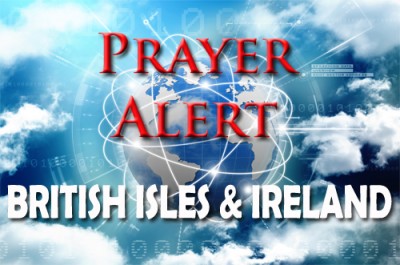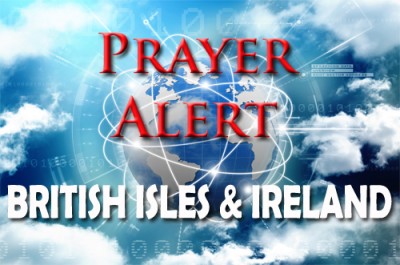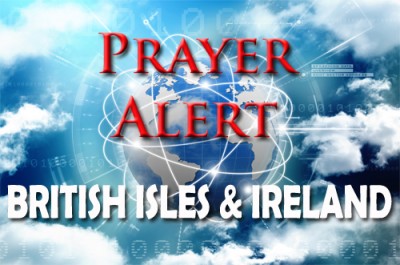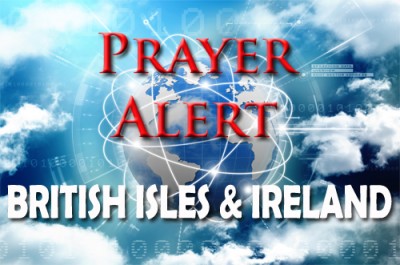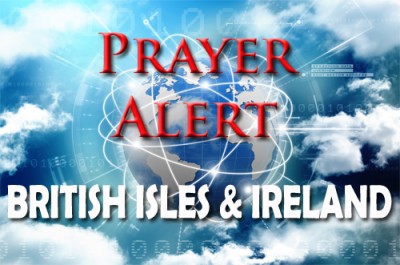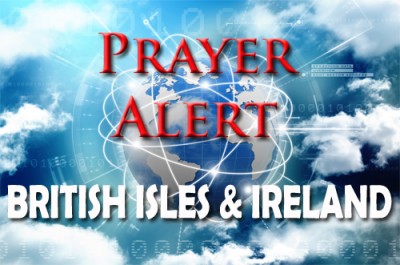Northern Ireland and redefinition of marriage
Arlene Foster, the First Minister of Northern Ireland, has said that her Democratic Unionist Party (DUP) will continue to use its veto to stop same-sex marriage. She said that her party felt ‘strongly’ that they should protect the definition of marriage, and referred to the huge outcry against the ruling in the Ashers Bakery case. Recently, 51 Unionists voted against redefining marriage - so opposition is not confined to the DUP.
Canada: ‘With glowing hearts we see you rise’
Mike Jacobs, husband of Cindy Jacobs, was woken at 5 am by the Lord reminding him of a prophetic word that was released in the early 1980s from their UK prayer network: ‘A revival will start in Western Canada, sweeping from the west to east, and then go down into the USA, and into Mexico, Central America, and South America.’ Mr Jacobs said, ‘God was saying to me in the morning, “Have I not said there is going to be a revival?” So He is stirring this word once again, and we are going to start seeing this revival.’ For the rest of this encouraging word for North America, click the ‘More’ button.
Prison Service not working
On 3 November, Justice Secretary Liz Truss unveiled a White Paper detailing £1.3bn investment in new prisons over the next five years along with plans for 2,100 extra officers, drug tests and more autonomy for governors. On 7 November 200 inmates created a ‘riot’ at HMP Bedford. This followed the death of a prisoner in HMP Pentonville, the third in England this year. Violence in jails is rising. The number of assaults rose by 1/3rd to 23,775 in the year to June 2016. This week the Government took emergency court action when 10,000 prison officers in England and Wales stopped work over working conditions in jails, where drugs are rife, mobile phones are smuggled in to organise illegal prison activity, and there is understaffing. It is illegal for the profession to strike, but the Prison Officers Association says ‘protest action’ is needed to keep staff and inmates safe. The service is ‘in meltdown’.
Christians denied UK visit - ‘too poor’
The Church of Scotland has condemned Home Office red tape that twice denied visas for an invited delegation of Pakistani Christians because they are too poor. The Presbytery of Glasgow vouched for the two delegates from the Church of Pakistan, invited as part of a twinning project between the two Christian communities. The Home Office refused entry to the two clergy despite the Church of Scotland assuring the Government that it is paying for the visit. The Presbytery will now raise the issue at the Home Office via Members of Parliament. The officer dealing with the case wrote to the church visitors, ‘It is acknowledged that the Church of Scotland will bear the costs of your visit. I am not satisfied you are genuinely seeking entry for a limited period - not exceeding six months. Unless financial circumstances change, future applications are likely to be refused.’
BBC: reduction in Christian programming?
The BBC will increase its multi-faith coverage in response to a report submitted to Lord Hall by BBC religion and ethics department head Aaqil Ahmed, who said that there is an imbalance in the network's religious output. So Lord Hall will speak with religious leaders next year to change its current programming of faith-based shows. Ahmed said BBC’s coverage does not reflect the faith of Muslims, Sikhs, and Hindus; ‘It’s too Christian’. Increased coverage of other faiths could include Friday prayers from a mosque along the lines of Songs of Praise. In 2011 a BBC survey found an overwhelming feeling that the BBC was in fact anti-Christian, and Christianity was consistently misrepresented. In 2012, the Director-General admitted that Christianity was treated ‘less sensitively’ than other religions. Since that time there have been numerous similar complaints of clear bias against Christianity, some coming from employees at the BBC themselves. A petition complaining about the downgrading of Christian programming can be signed at
Justin Welby in post-Brexit think-tank
The Archbishop of Canterbury will spend the next two years as part of a commission launched by a left-leaning think-tank that aims to rewrite the rules for Britain’s post-Brexit economy. He will join, among others, the general secretary of the TUC and the chairman of the John Lewis Partnership on the Institute for Public Policy Research (IPPR) programme that will seek remedies for six key UK weaknesses. These are seen to be: the fact that our successful economy masks weak investment; a trade deficit; a budget deficit that will grow as the population ages; the capture of the fruits of growth by a small minority; the gap between the south-east and the rest of the country; and poor progress in meeting the country’s climate change ambitions. None of these six problems is a recent phenomenon. Each one has been worsening for a quarter of a century. Downing Street is keenly interested in the commission’s work.
Scotland: national day of prayer
30 November is St Andrew’s Day, and the Church of Scotland has called for a dedicated national day of prayer this year. St Andrew, eventually crucified upside down, is the patron saint of fishermen, and his feast day is most often remembered in fishing villages, especially in his native Scotland. The day sometimes coincides with the start of Advent (the first Sunday after 26 Nov). This St Andrew’s Day, please pray for Scotland’s Free Church to be free of complacency, and for the preaching the word to be central to all evangelism. Pray for many Christians to reflect on their lives in the light of the life of Andrew, the first-called apostle. May they also reflect on the first day of Advent, and the significance today of the message of the coming of Christ. See also
Muslim convert persecuted for his beliefs
Nissar Hussain and his family, including six children, have been forced to flee their home for the second time, amid fears for his safety after suffering seven years of persecution from his Muslim neighbours. He converted from Islam to Christianity and appeared in a 2008 TV documentary about mistreatment of Muslim converts. He was hospitalised a year ago after a brutal attack caught on CCTV. This week the fifty-year-old and his family were moved to a safe place by armed police. Mr Hussain said the culmination of continued 'extreme persecution' had devastated his family,and the dramatic arrival of armed police was a complete surprise. He said, 'My family are distraught and very traumatised to be leaving. But when your life is at stake, there is no other choice.' Mr Hussain converted to Christianity twenty years ago, but in recent years he has been subjected to harassment and violence, particularly after the documentary.



